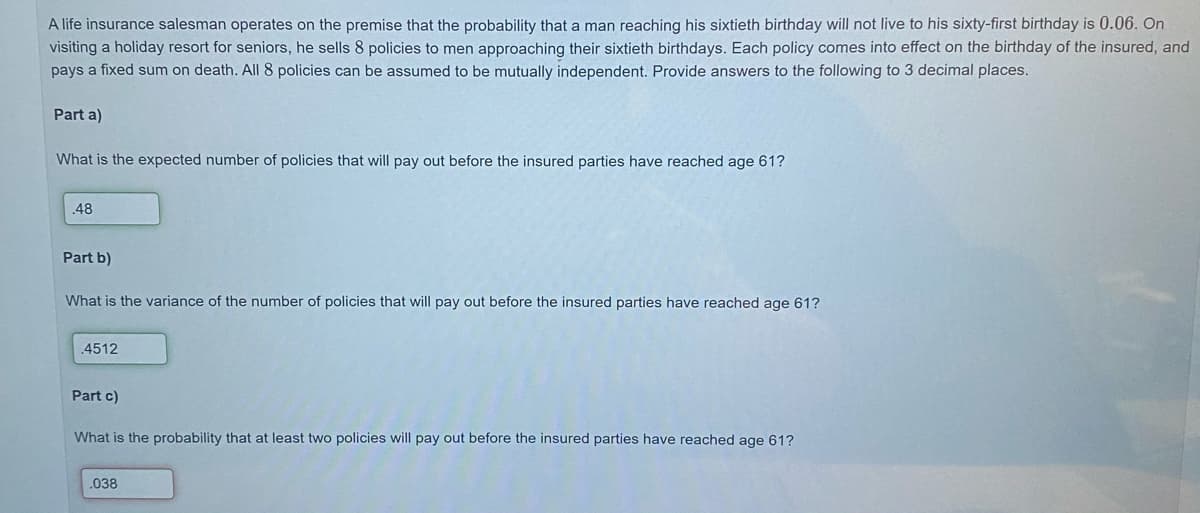A life insurance salesman operates on the premise that the probability that a man reaching his sixtieth birthday will not live to his sixty-first birthday is 0.06. On visiting a holiday resort for seniors, he sells 8 policies to men approaching their sixtieth birthdays. Each policy comes into effect on the birthday of the insured, and pays a fixed sum on death. All 8 policies can be assumed to be mutually independent. Provide answers to the following to 3 decimal places. Part a) What is the expected number of policies that will pay out before the insured parties have reached age 61? 48 Part b) What is the variance of the number of policies that will pay out before the insured parties have reached age 61? .4512 Part c) What is the probability that at least two policies will pay out before the insured parties have reached age 61? .038
A life insurance salesman operates on the premise that the probability that a man reaching his sixtieth birthday will not live to his sixty-first birthday is 0.06. On visiting a holiday resort for seniors, he sells 8 policies to men approaching their sixtieth birthdays. Each policy comes into effect on the birthday of the insured, and pays a fixed sum on death. All 8 policies can be assumed to be mutually independent. Provide answers to the following to 3 decimal places. Part a) What is the expected number of policies that will pay out before the insured parties have reached age 61? 48 Part b) What is the variance of the number of policies that will pay out before the insured parties have reached age 61? .4512 Part c) What is the probability that at least two policies will pay out before the insured parties have reached age 61? .038
Elements Of Modern Algebra
8th Edition
ISBN:9781285463230
Author:Gilbert, Linda, Jimmie
Publisher:Gilbert, Linda, Jimmie
Chapter2: The Integers
Section2.7: Introduction To Coding Theory (optional)
Problem 7E
Related questions
Concept explainers
Contingency Table
A contingency table can be defined as the visual representation of the relationship between two or more categorical variables that can be evaluated and registered. It is a categorical version of the scatterplot, which is used to investigate the linear relationship between two variables. A contingency table is indeed a type of frequency distribution table that displays two variables at the same time.
Binomial Distribution
Binomial is an algebraic expression of the sum or the difference of two terms. Before knowing about binomial distribution, we must know about the binomial theorem.
Topic Video
Question
I cannot figure out part c, please show me how

Transcribed Image Text:A life insurance salesman operates on the premise that the probability that a man reaching his sixtieth birthday will not live to his sixty-first birthday is 0.06. On
visiting a holiday resort for seniors, he sells 8 policies to men approaching their sixtieth birthdays. Each policy comes into effect on the birthday of the insured, and
pays a fixed sum on death. All 8 policies can be assumed to be mutually independent. Provide answers to the following to 3 decimal places.
Part a)
What is the expected number of policies that will pay out before the insured parties have reached age 61?
.48
Part b)
What is the variance of the number of policies that will pay out before the insured parties have reached age 61?
.4512
Part c)
What is the probability that at least two policies will pay out before the insured parties have reached age 61?
.038
Expert Solution
This question has been solved!
Explore an expertly crafted, step-by-step solution for a thorough understanding of key concepts.
This is a popular solution!
Trending now
This is a popular solution!
Step by step
Solved in 2 steps with 2 images

Knowledge Booster
Learn more about
Need a deep-dive on the concept behind this application? Look no further. Learn more about this topic, probability and related others by exploring similar questions and additional content below.Recommended textbooks for you

Elements Of Modern Algebra
Algebra
ISBN:
9781285463230
Author:
Gilbert, Linda, Jimmie
Publisher:
Cengage Learning,

Algebra and Trigonometry (MindTap Course List)
Algebra
ISBN:
9781305071742
Author:
James Stewart, Lothar Redlin, Saleem Watson
Publisher:
Cengage Learning

College Algebra
Algebra
ISBN:
9781305115545
Author:
James Stewart, Lothar Redlin, Saleem Watson
Publisher:
Cengage Learning

Elements Of Modern Algebra
Algebra
ISBN:
9781285463230
Author:
Gilbert, Linda, Jimmie
Publisher:
Cengage Learning,

Algebra and Trigonometry (MindTap Course List)
Algebra
ISBN:
9781305071742
Author:
James Stewart, Lothar Redlin, Saleem Watson
Publisher:
Cengage Learning

College Algebra
Algebra
ISBN:
9781305115545
Author:
James Stewart, Lothar Redlin, Saleem Watson
Publisher:
Cengage Learning

Algebra & Trigonometry with Analytic Geometry
Algebra
ISBN:
9781133382119
Author:
Swokowski
Publisher:
Cengage